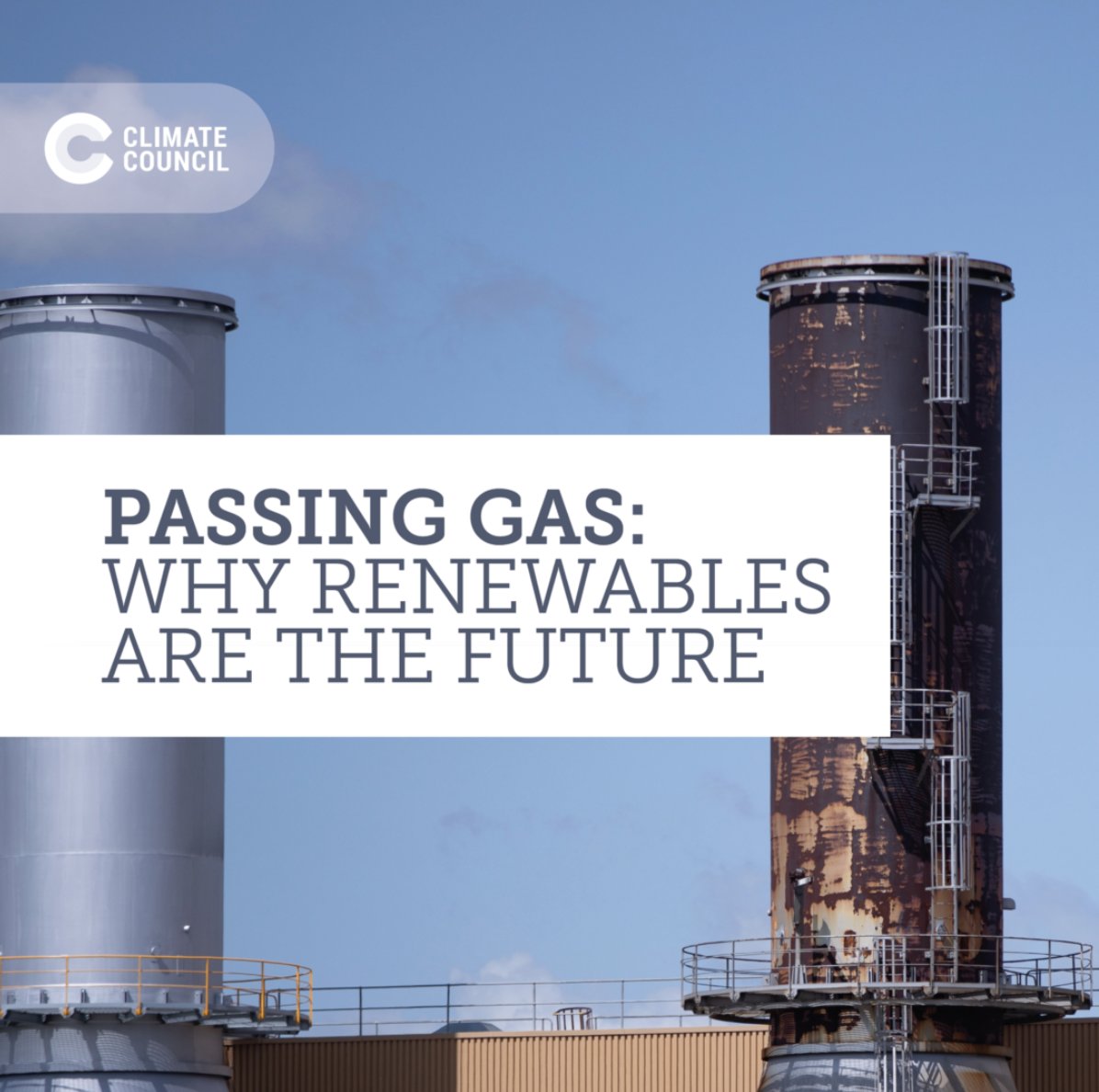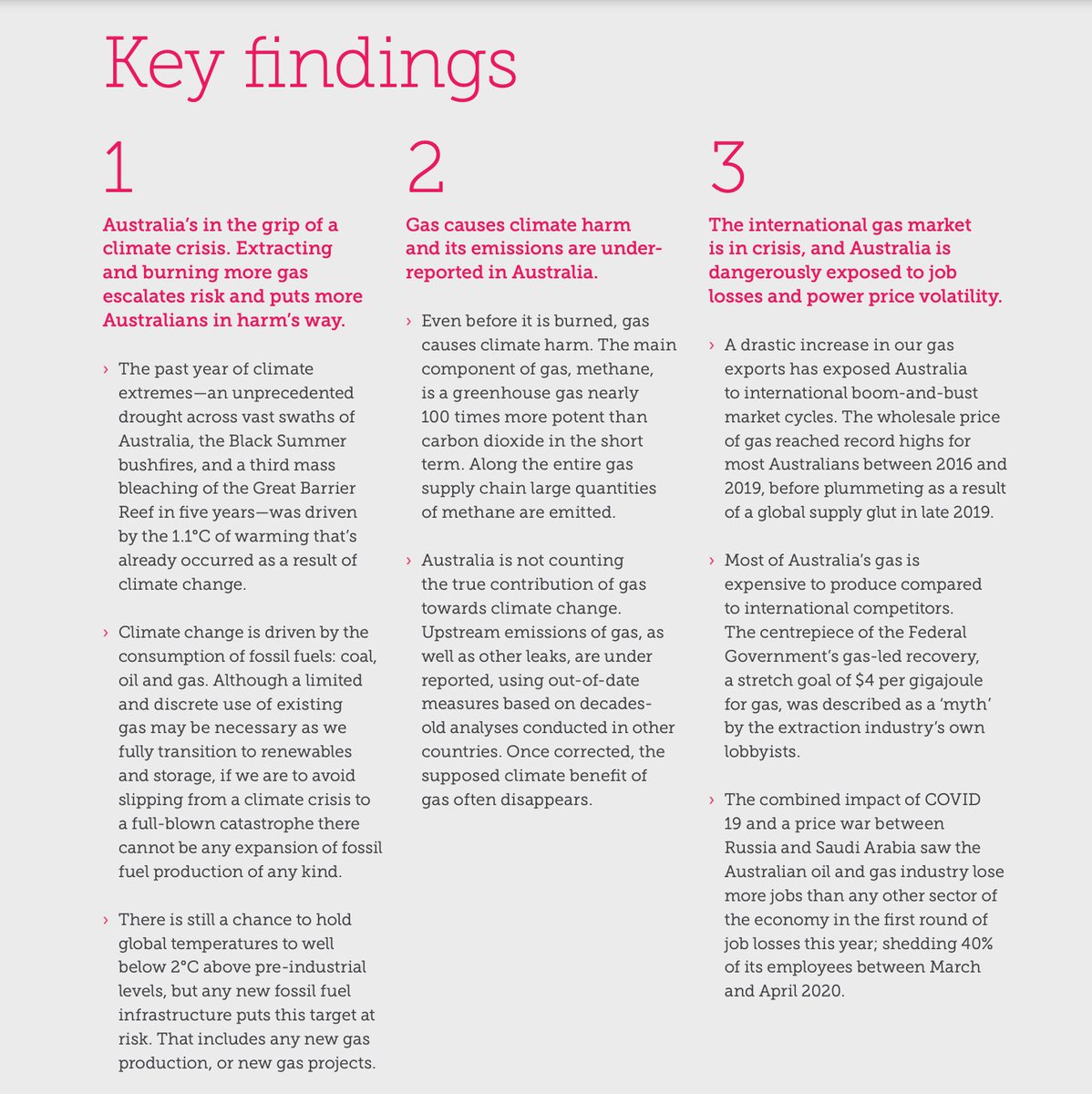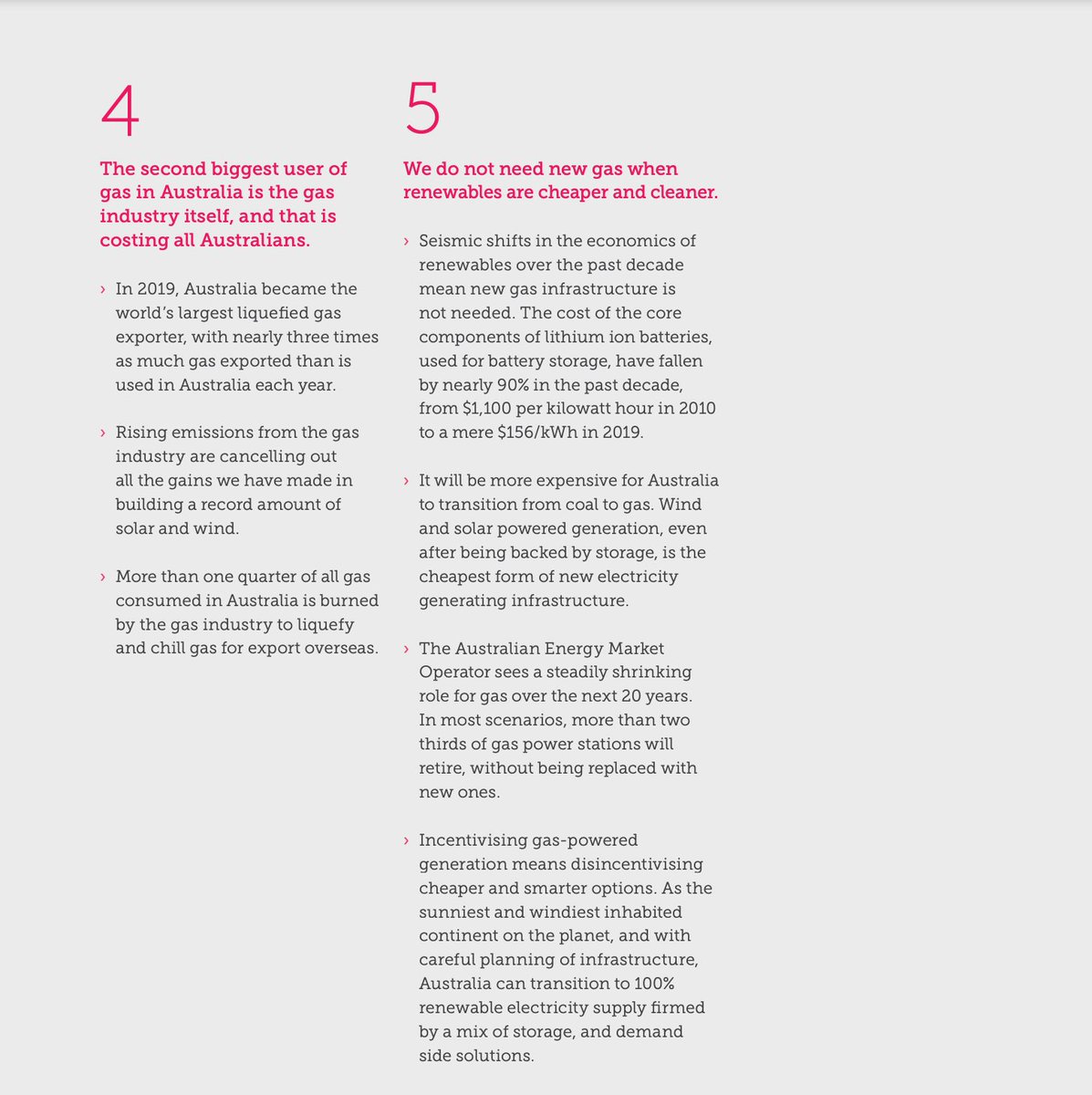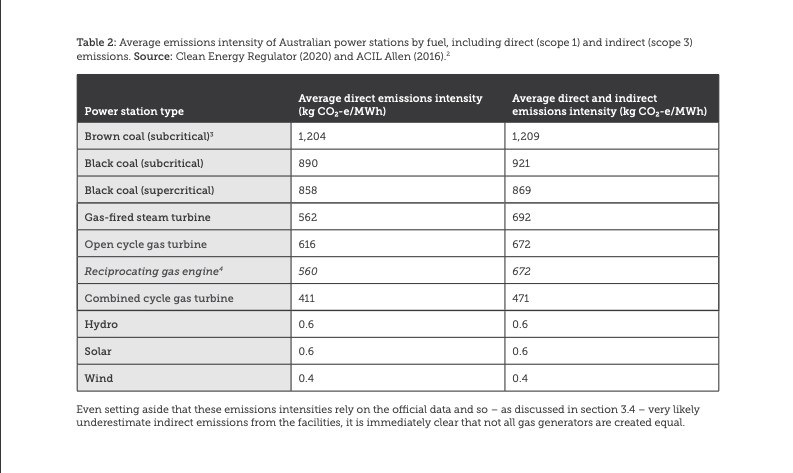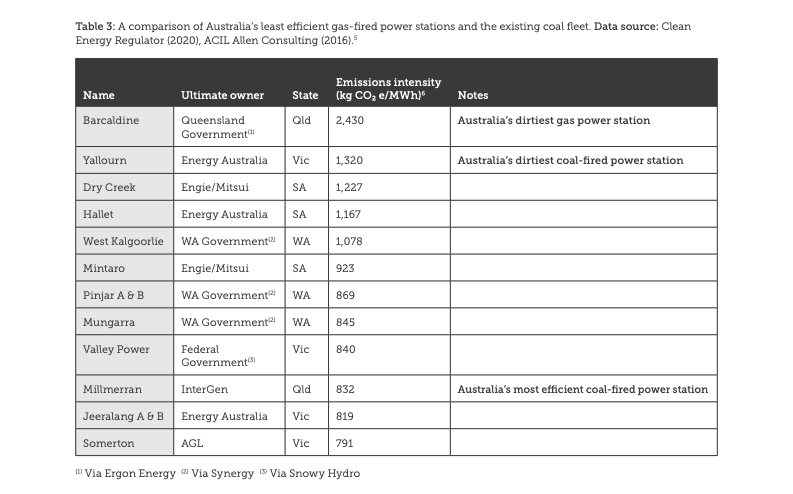The report that has been my life for months now finally came out today, and it has heaps of useful info.
I've been working in the space for years, and even I was shocked some the things I found.
I'm going to step through some bits I think will help others in threads.
I've been working in the space for years, and even I was shocked some the things I found.
I'm going to step through some bits I think will help others in threads.

The report has its key findings.
They are perfectly serviceable - and were written by the comms geniuses at @climatecouncil - but if I'm summarising this multifaceted report in a single sentence:
Gas is more harmful than you know, and very much more unnecessary than you think.
They are perfectly serviceable - and were written by the comms geniuses at @climatecouncil - but if I'm summarising this multifaceted report in a single sentence:
Gas is more harmful than you know, and very much more unnecessary than you think.
Let's start with harmful.
Gas is harmful in two key ways: Bad for the climate and bad for jobs.
I've had a long day, so I am *just* going to do harmful to the climate tonight.
This really is a bumper report, and I'm paid to say that it has a lot to recommend it.
Gas is harmful in two key ways: Bad for the climate and bad for jobs.
I've had a long day, so I am *just* going to do harmful to the climate tonight.
This really is a bumper report, and I'm paid to say that it has a lot to recommend it.
Gas is primarily made of methane. This makes it both a fossil fuel and a greenhouse gas in its own right.
First and crucially: To arrest the continued destabilisation of the global climate we must prevent the burning of fossil fuels in every instance where it is possible.
First and crucially: To arrest the continued destabilisation of the global climate we must prevent the burning of fossil fuels in every instance where it is possible.
There's no room left in the global carbon budget for running a protection racket on your favourite fossil fuel. Anyone campaigning for the Volunteer Gas Industry Safety Brigade needs to have their claims scrutinised in the context of the climate harms already seen.
Australia is running a fever. The country's temperature is 1.44°C above where is was in 1910, and there is worse to come.
At that temperature, we've seen unprecedented drought, which @ClimateNerilie and colleagues have shown is linked to the destabilisation of the climate.
At that temperature, we've seen unprecedented drought, which @ClimateNerilie and colleagues have shown is linked to the destabilisation of the climate.
We've seen the third mass bleaching of the Great Barrier Reef in 5 years, which people like @ProfTerryHughes and @oveHG (along with *many* others) have documented.
@AndrewKingClim showed that this kind of event was 'almost impossible' without the destabilisation of the climate.
@AndrewKingClim showed that this kind of event was 'almost impossible' without the destabilisation of the climate.
And then we've seen Black Summer.
I don't want to quantify that again. It's too much.
If you need to read it, it's on pages 4-5: https://www.climatecouncil.org.au/wp-content/uploads/2020/12/FINAL-CC_MVSA0245-CC-Report-Gas_V5-FA_Low_Res_Single_Pages.pdf#page=9
I don't want to quantify that again. It's too much.
If you need to read it, it's on pages 4-5: https://www.climatecouncil.org.au/wp-content/uploads/2020/12/FINAL-CC_MVSA0245-CC-Report-Gas_V5-FA_Low_Res_Single_Pages.pdf#page=9
This *is* fossil fuels.
This *is* coal. This *is* oil. This *is* gas.
Gas is now the world's fastest growing fossil fuel and increases its burden on the global atmosphere every year.
Expanding gas production puts Australians in harm's way.
Making it your pet fuel is weird.
This *is* coal. This *is* oil. This *is* gas.
Gas is now the world's fastest growing fossil fuel and increases its burden on the global atmosphere every year.
Expanding gas production puts Australians in harm's way.
Making it your pet fuel is weird.
But the thing that really gets to me is the bullshit that is spread about gas in the process of advocating for it as the friendly, sunny way to bring about ever-worsening climate harms.
This trend happens across the world, but Australia is *just so good* at swallowing it
This trend happens across the world, but Australia is *just so good* at swallowing it
That brings us to the second point: Australia doesn't really require *measurement* of the full climate impact of the gas industry.
Instead, we estimate, using 'emissions factors'. Emissions factors aren't necessarily problematic, if they are done right.
They aren't done right.
Instead, we estimate, using 'emissions factors'. Emissions factors aren't necessarily problematic, if they are done right.
They aren't done right.
The emissions factors used in Australia are, for the most part, based on a single (extensive!) assessment the was conducted in the USA in 1992.
A 3-decade-old study, conducted on a different continent at a time where the unconventional gas industry barely existed. Awesome.
A 3-decade-old study, conducted on a different continent at a time where the unconventional gas industry barely existed. Awesome.
Periodically, these factors are confirmed as appropriate for the 21st century Australian gas industry in non-peer-reviewed, gas-industry funded studies with small sample sizes.


After that, we also fail to account for the impact of the methane correctly. I went through this in a piece with @adamlmorton, and took a bit of a deep dive into the numbers afterward in the thread that starts in this. https://twitter.com/timinmitcham/status/1298619213674774529?s=20
.@zebnicholls and I explained it a bit more here in this piece, as well. https://theconversation.com/climate-explained-methane-is-short-lived-in-the-atmosphere-but-leaves-long-term-damage-145040
The report steps through that again, in the context of the gas industry.
Then there's my favourite new bit. We *also* recalculated the emissions intensity of gas power station on the NEM (Vic, Tas, ACT, almost all of NSW, major populated regions of SA, Qld) and SWIS (SW WA).
Then there's my favourite new bit. We *also* recalculated the emissions intensity of gas power station on the NEM (Vic, Tas, ACT, almost all of NSW, major populated regions of SA, Qld) and SWIS (SW WA).
You know how you've heard that gas is half of the emissions of coal?
No. Sorry. That is not true. It is a big fudge and reality is more complicated.
Gas-fired generators vary greatly by technology type.
No. Sorry. That is not true. It is a big fudge and reality is more complicated.
Gas-fired generators vary greatly by technology type.
The generation types that are more efficient (steam, CCGT) are the types that are less-suitable to a 21st century grid.
The ones that ramp-up and down are arguably more useful (OCGT and reciprocating), but are nowhere near half the emissions of coal.
The ones that ramp-up and down are arguably more useful (OCGT and reciprocating), but are nowhere near half the emissions of coal.
But *just* relying on the volume weighted averages in the table above is deeply misleading. The ten least efficient generators on the grid all rival the emissions intensity of coal. Here is their emissions intensities over FY16-FY19.
I'm really tired, and it has been a long day - but a good one - I will offer plenty more from the report.
If you want to read ahead though, try this: https://www.climatecouncil.org.au/resources/passing-gas-renewables-are-future/
If you want to read ahead though, try this: https://www.climatecouncil.org.au/resources/passing-gas-renewables-are-future/
And I haven't chucked a plug out there for a while, but if you like what I do and want to support it: https://www.climatecouncil.org.au/donate

 Read on Twitter
Read on Twitter